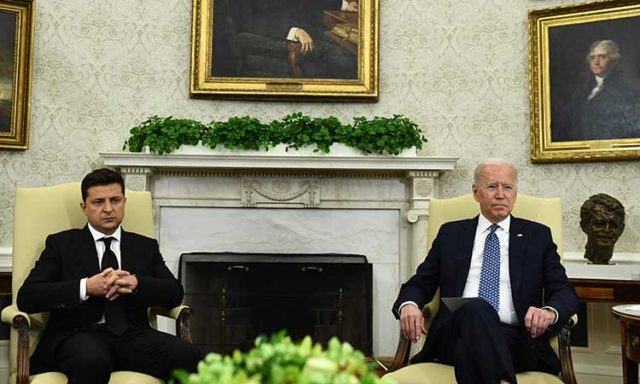
Biden Administration Aligns With Kremlin Push for Minsk ‘Agreements’ on Ukraine (Part One)
Publication: Eurasia Daily Monitor Volume: 18 Issue: 186
By:

Russia imposed the Minsk “agreements” on Ukraine in 2014 and 2015 through military force. Ukraine’s government and civil society regard the terms of those documents as inimical to the national interests. They spent these seven years resisting, evading, and asking to change those terms.
Throughout this time, Russia has repeatedly said in frustration that only Ukraine’s Western “curators” (patrons), first and foremost the United States, can deliver Ukrainian compliance with the Minsk “agreements.” Moscow offered all along to accept Washington in any negotiating format if Washington understood its role to be that of pressing Ukraine to comply. The Barack Obama administration tried to do this as part of its Russia Reset, but it ran out of time. The Joseph Biden administration, led by some Obama administration veterans, has embarked on another attempt, again subordinating its policy toward Ukraine to its policy toward Russia. While the Obama administration had smugly underestimated Russia, the Biden administration believes that it needs Russia’s cooperation on a wide range of global and regional challenges to the United States. Its quest for Russian “help” is forcing the administration into tradeoffs.
The Biden administration, therefore, seems prepared to “park” Ukraine in a gray zone between the institutional West and Russia. The inflection point in the administration’s decisions can be traced to late April–early May, when the White House charted its Russia policy and, derived from it, its Ukraine policy. Accordingly, the administration has: withheld and withdrawn political support to Ukraine’s membership in the North Atlantic Treaty Organization (NATO); lifted available sanctions that would have stopped Russian Gazprom’s Nord Stream Two pipeline to Germany bypassing Ukraine; and endorsed the Minsk “agreements” that would end Russia’s war in Ukraine’s Donbas on Russian terms. These decisions were apparently notified to Kyiv with little to no prior coordination (see EDM, May 6, 10, 27, June 1, 17, September 16).
The administration has deferred to Russia, at Ukraine’s expense, on those three major issues. It has recognized them as Russian priorities and it expects, in return, Russian cooperation on US priority issues (or predicaments). Russia, however, cannot be certain that the Biden administration would or could ultimately deliver those concessions in full. To guarantee the delivery, Russia seemingly threatens to attack Ukraine again with military force, but in fact the Biden administration is the main political target of this hyper-inflated threat (Carnegiemoscow.org December 6, 9). Thus, US concessions to Russia over Ukraine’s NATO aspirations, Nord Stream Two, and the Minsk “agreements” are not simply traded off any longer (as was initially the case) but are also, at this point, being extorted by the Kremlin from the Biden administration.
Last week, the White House and the Kremlin agreed to start talks about a possible overall reconfiguration of security arrangements in Europe’s East, with Ukraine as the central object of negotiations. Russian threats of military action against Ukraine helped precipitate President Biden’s consent. Washington notified Kyiv about this decision again post factum (see EDM, December 8, 9), notwithstanding the recently signed strategic partnership. The White House has for a whole year declined to even nominate an ambassador to Ukraine (while the rumored possible candidates lack the necessary gravitas). The US-Ukraine strategic partnership rests on a bipartisan Congressional majority and the Pentagon at this point. Russia, however, proposes to bar not only NATO membership but also bilateral military assistance for Ukraine in the negotiations that were just announced.
President Biden agreed with Russian President Vladimir Putin at their meeting in Geneva in June that the war in Ukraine’s east be settled on the basis of the Minsk “agreements” (Kremlin.ru, Whitehouse.gov, June 16). Washington notified Kyiv, post factum and moreover publicly, by Undersecretary of State Victoria Nuland advising Ukraine to accept the Minsk documents, including “political autonomy” of the Russian-controlled territory (Radio Svoboda, June 17).
Washington did not press the issue publicly in the next few months. It did not mention this issue when Ukrainian President Volodymyr Zelenskyy visited the White House in early September, nor at the signing of the US-Ukraine Strategic Partnership Charter by Secretary of State Antony Blinken and Foreign Minister Dmytro Kuleba on November 10. At that point, however, the Biden administration had already coordinated its steps on this issue directly with Moscow.
On October 13, in Moscow, Nuland endorsed the 2015 Minsk “agreement” in its existing form, including “special status” for the Russian-controlled Donbas, to the delight of her interlocutor Dmitry Kozak, Russia’s presidential envoy on the protracted conflicts. Nuland also conveyed Washington’s hopes for Russian cooperation on a range of US priority issues, creating the impression that Washington was, in turn, recognizing Russia’s priority interest in Ukraine. While Kozak and other Russian officials issued readouts, Washington kept silent on this matter (Kommersant, October 13; TASS, October 13, 14; see EDM, October 20).
In early November, CIA Director William Burns paid a two-day visit to Moscow. On November 9, Russian Foreign Minister Sergei Lavrov confirmed that Nuland and Burns had discussed implementing the Minsk “agreement” with a “special status” for the Russian-controlled territory (TASS, November 9). Washington neither confirmed nor denied this; it kept silent.
Finally, Secretary of State Antony Blinken came out loud and clear in support of the Minsk “agreements” on December 2–3, at the Organization for Security and Cooperation in Europe’s (OSCE) year-end ministerial meeting. Blinken’s speech offered, in effect, to take the lead with Ukraine in implementing the terms that Russia had failed to enforce thus far (State.gov, December 2).



